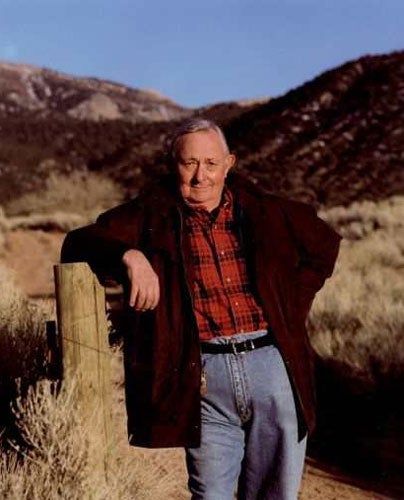Tony Hillerman: Writer who won critical acclaim for his tales of Navajo crime fighters

The crime writer Tony Hillerman won critical acclaim as well as professional awards – from the Crime Writers of America (CWA) and the Western Writers of America (WWA) – for his vivid, lyrical and absorbing novels featuring Native American (in his case Navajo) sleuths at work in contemporary America. However, probably the honour he was most proud of was that of "Special Friend of the Dineh" which was conferred on him by the Navajo Nation in 1987 in recognition of his honest portrayals of Native Americans and their culture in the modern world.
It was not surprising that Hillerman's knowledge and understanding of Native American lore and culture was so profound, since he had been brought up among Potawatomie and Seminole Indians in Oklahoma. He attended Indian schools for eight years. Yet while suffusing his novels with Navajo lore and a thrilling sense of place (his descriptions of the mesas, the sagebrush and the vast desert areas of the American South-west are rarely less than dramatic), Hillerman never forgot that he was an entertainer. "The name of the game," he wrote, "is mystery and suspense. What's really important is the narration which moves against [this] authentic background."
His two main characters were Navajo tribal cops: Lieutenant Joe Leaphorn, a shrewd pragmatist who views many of the older tribal ways with scepticism (and has a masters degree in anthropology), and the young and passionate Sergeant Jim Chee, who believes in the old tribal gods and seeks to become a shaman, or medicine man.
In his novels Hillerman not only set up clashes between cultures, between the Navajo way and the American Dream (which frequently turned out to be the American nightmare), but also examined tensions between his two principal characters, each bringing to the solving of a crime their own beliefs and individual life patterns.
Tony Hillerman was born in Sacred Heart, Oklahoma in 1925. His father was a farmer and shopkeeper who only just managed to survive in the Dust Bowl. Years later, Hillerman used to joke that John Steinbeck's Joad family in The Grapes of Wrath were in fact the lucky ones, since they clearly had enough money to move to California.
He attended Indian schools and then Oklahoma State University before enlisting in the infantry and fighting in Europe during the Second World War. Badly wounded in 1945, he emerged from the army with a Silver Star, a Bronze Star and a Purple Heart. He then took up his studies again, this time at the University of Oklahoma, where he gained a BA in journalism in 1948.
In the early 1950s, Hillerman held down numerous posts, including news editor of the Morning Press and City editor of the Constitution, both in Lawton, Oklahoma, and executive editor of the New Mexican in Santa Fe. He then moved to Albuquerque, New Mexico, and finally put down roots, gaining an MA in English at the University of New Mexico, where he subsequently taught creative writing and lectured in ethnic studies for the journalism faculty.
His first book, The Blessing Way (1970), took him three years to write and then three months to rewrite after Joan Kahn, the mystery editor at Harper's, sent him a detailed critique, telling him to "beef up" one of his secondary characters. "Ironically," Hillerman said, "that character was Joe Leaphorn. I'd originally had a white anthropologist as the protagonist. I owe my career to Joan Kahn."
His second book, The Fly on the Wall (1971) was non-series, and utilised his own journalistic background in a tale of politics, greed and big-city corruption. Thereafter, he settled down to chronicle the fictional crimes that occurred on the Navajo reservation in Arizona and the surrounding areas of Utah and New Mexico.
From the start he was not afraid to use religious or folkloristic themes. In The Blessing Way there are hints that the Navajo equivalent of a werewolf is roaming the reservation. In Dance Hall of the Dead (1973), for which he won the Mystery Writers of America Edgar Award for the year's best mystery novel, there is an emphasis on Navajo sacred ritual and ceremony. In A Thief of Time (1988) the spirit of the hunchbacked god Kokopelli looms as an almost physical presence in a tale of looted religious artefacts, and in the superb Skinwalkers (1987), which won the WWA's coveted Golden Spur award, a chilling atmosphere of evil and witchcraft pervades. In 1991 Hillerman received the MWA's highest honour, the Grandmaster Award, for his body of work.
As well as mystery novels, Hillerman wrote a children's book, The Boy Who Made Dragonfly – A Zuni Myth (1972) and produced a number of lavish photographic books on the American South-west, including New Mexico (1974), Rio Grande (1975), Indian Country: America's sacred land (1987), and Hillerman Country: a journey through the Southwest (1991), with photographs by his brother, Barney. He also edited for the University of New Mexico Press The Spell of New Mexico (1977). An autobiography, Seldom Disappointed, was published in 2001.
Jack Adrian
Anthony Grove Hillerman, writer, folklorist and academic: born Sacred Heart, Oklahoma 27 May 1925; married 1948 Marie Unzner (six children); died Albuquerque, New Mexico 26 October 2008.
Subscribe to Independent Premium to bookmark this article
Want to bookmark your favourite articles and stories to read or reference later? Start your Independent Premium subscription today.

Join our commenting forum
Join thought-provoking conversations, follow other Independent readers and see their replies